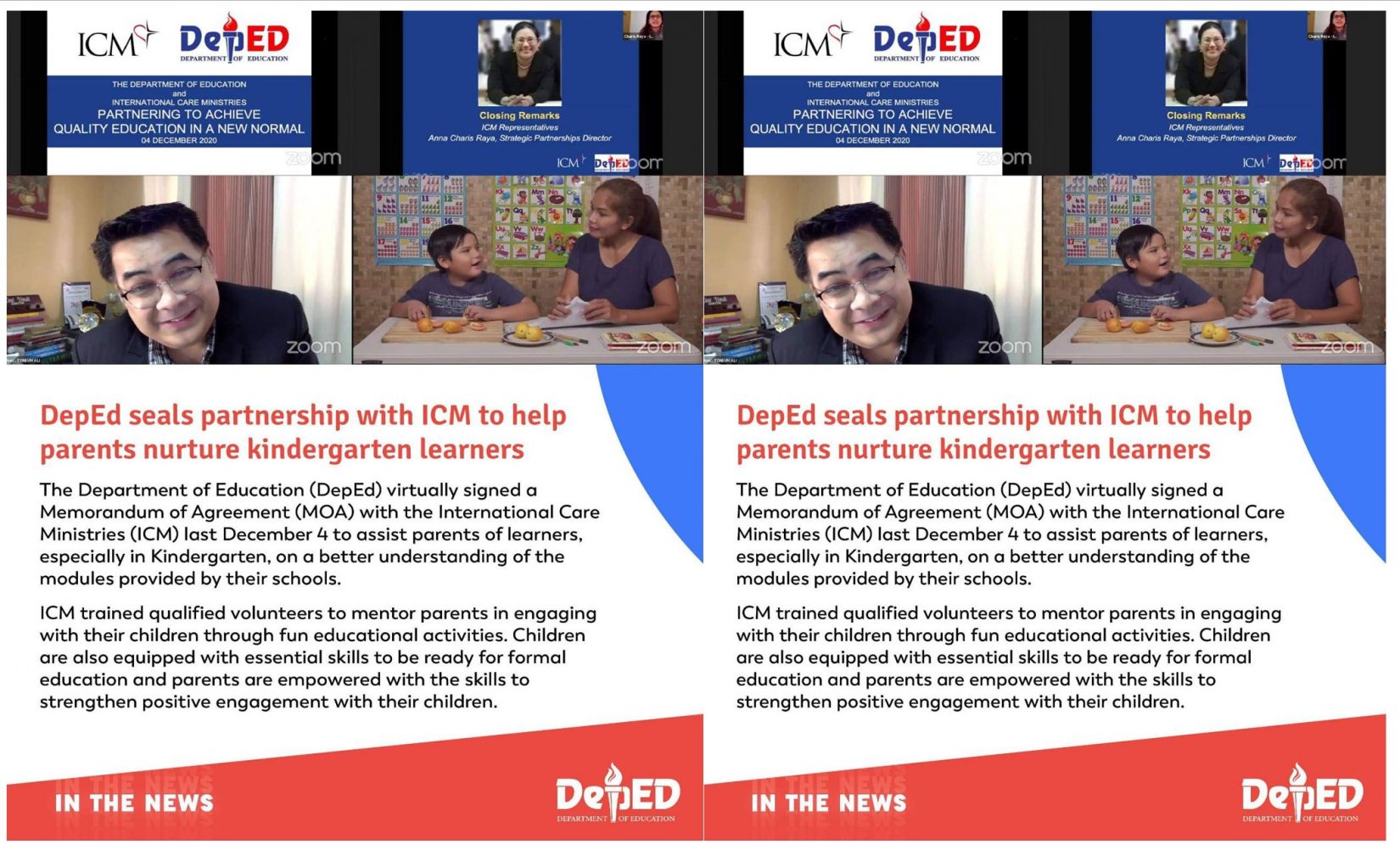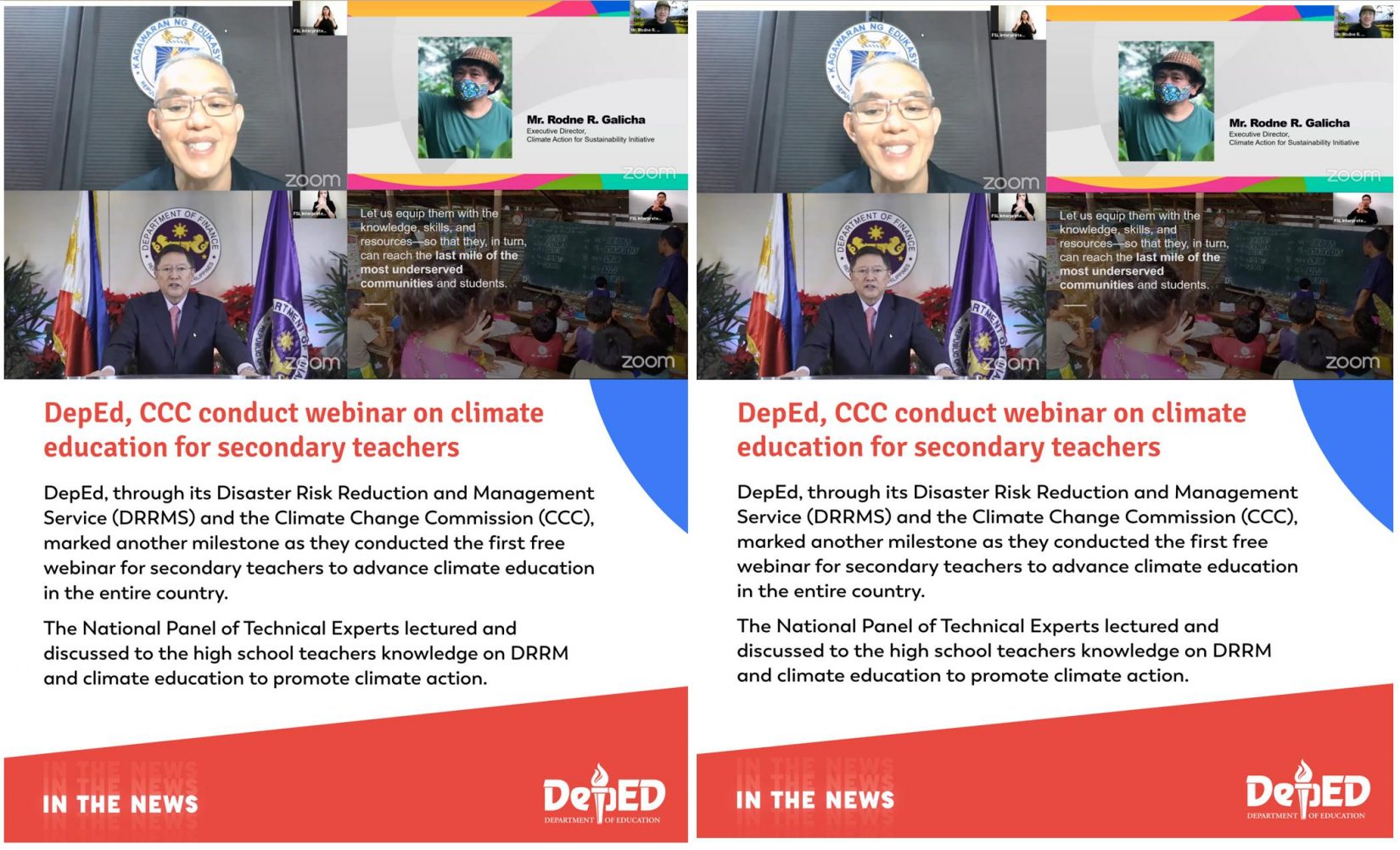
Ms. Mj Balaguer of DZMJ Online get to interview the beautiful lady behind the P-POP Boyband SB19, its Korean trainer and the entire video can be viewed at DZMJ Online Season 17 Episode 4.


DepEd seals partnership with ICM to help parents nurture kindergarten learners
December 10, 2020 – The Department of Education (DepEd) virtually signed a Memorandum of Agreement (MOA) with the International Care Ministries (ICM) last December 4 to assist parents of learners, especially in Kindergarten, on a better understanding of the modules provided by their schools.
“Ang papel na ginagampanan ng ating mga magulang ay talaga pong hindi natin basta-basta maisasantabi dahil po distance learning na lang ang aming pinapatupad,” said Undersecretary for Legislative Affairs, External Partnerships, and Project Management Service Tonisito Umali.
“Lahat ng [pamamaraan ng] pag-aaral [ng ating mga anak] na nangyayari [na] nananatili [lamang sila sa] ating tahanan at walang pisikal na guro na puwede pong tumugon sa kanilang pangangailangan, [kinakailangan] ang ating mga magulang [ay] ating maaasahan,” he added.
ICM Education Strategy Director Anna Alegre highlighted the ICM’s Two-Generation approach where the adults are being taught primary lessons and skills in values, health, livelihood, and parenthood while advocating nutrition, health, and the education of children to benefit the two generations in having a better future.
“Nais namin i-maximize ang tulong para sa mga ultrapoor na magulang na maging successful na tagapagdaloy ng karunungan sa tahanan hindi lang po pati sa academics kundi pati na sa mga essential attitudes towards education,” ICM Dir. Alegre said.
Furthermore, ICM trained qualified volunteers to mentor parents in engaging with their children through fun educational activities. Children are also equipped with essential skills to be ready for formal education and parents are empowered with the skills to strengthen positive engagement with their children.
ICM also expressed their desire to offer their 10-week home-based parent coaching program for preschoolers and parents through the Family Academy (FA) in Regions IV-B MIMAROPA, 6, 7, 9, and 12.
Region 12 Director Allan Farnazo expressed his gratitude to the ICM in this initiative that will help both parents and learners in studying the self-learning modules provided.
“Today in this time of pandemic, parents who are able to provide, assist, and facilitate learning at home have a better advantage of making learning happen. Knowing the importance, ICM has stepped into providing opportunities in parents to learning and acquiring best knowledge on how to manage the young learners,” said RD Farnazo.
Through this partnership, the Department expressed its intention and openness to work side by side with ICM in providing help, inspiring hope and creating change for families living in extreme poverty in the different areas across the country.
END—


DepEd, CCC conduct webinar on climate education for secondary teachers
December 11, 2020 – The Department of Education (DepEd), through the Disaster Risk Reduction and Management Service (DRRMS), and the Climate Change Commission (CCC), marked another milestone as they conducted the first free webinar for secondary teachers to advance climate education in the entire country.
A handful of renowned people in the field of climate action graced the “Climate Science Master Class for High School Teachers” to share about climate education via Zoom and Facebook Live last November 24, 2020, as part of the activities for the 4th National Climate Change Conference (NCCC) and the 13th Annual Global Warming and Climate Change Consciousness Week.
The Master Class featured lectures and discussion by the National Panel of Technical Experts, the government’s lead technical advisory body on climate science and technology, and oriented the high school teachers on the knowledge materials that DepEd-DRRMS and its partners are developing to help teachers effectively unpack learning competencies on climate change and promote climate action.
Mr. Jerome E. Ilagan, Chief of the Policy Research and Development Division of the CCC, affirmed that the idea of making climate education accessible to more students across the country is a priority.
With this in mind, they organized the said webinar to integrate climate education in many basic learning areas like Math, English, Filipino, Araling Panlipunan, and others.
One of the key speakers, DepEd-DRRMS Dir. Ronilda R. Co, informed the participants that they have plotted three ways to make climate education happen with the means of references such as creating a Microsite on Curated Resources for Teaching Climate Change as an online website, developing handbooks and self-learning modules, and producing the KALIKHASAN: Likha at Lakas ng Kabataan Para sa Kalikasan: a creative sourcebook on using theater for climate change education and action.
“[By means of this,] we want to generate the best from the youth, we want to hear their critiques,” she stated, remarking how the youth are engaging efforts to make a difference in these trying times.
Furthermore, the proposed handbooks consist of the following topics: The Science of Climate Change, Climate and Disaster Risk, Impacts of Climate Change on Human Beings, and Solutions to Climate Change.
The teacher-participants were also exposed to informative topics like the roles of greenhouse gases in global warming, ocean acidification, mitigation and adaptation, climate change on the health, responsibilities in climate change, biodiversity as well as other topics to consider.
Meanwhile, a total number of 1,100 participants joined the Zoom session while its Facebook streaming garnered 46,800 viewers.
The CCC Vice-Chairperson and Executive Director Emmanuel M. De Guzman expressed his high hopes for the project that is about to materialize.
“Together, let us pave the way for a new generation of Filipinos fully aware and knowledgeable of the various dimensions of the climate emergency and fully committed to usher[ing] a brighter, safer, and more secure future for the Filipino nation,” he remarked.
This Master Class is part of the activities of the Department’s celebration of the 4th NCCC which went full-digital this year. More information about the conference can be found on https://bit.ly/4thNCCC.
END
This article was written and prepared by Erin Consebido (Student-Journalist) and Abigail Mirabel-Agapay (School Paper Adviser) from Liliw National High School, Division of Laguna who are graduates of DepEd-DRRMS and AYEJ.org’s Green Beat Initiative: An Online Environmental Journalism Training.

ACT TEACHERS COMMEMORATES INT’L DAY OF SIGN LANGUAGES Urges Congress to allot budget for Filipino Sign Language By MARVYN N. BENANING
Assistant Minority Leader and ACT Teachers Rep. France Castro and ACT Teachers President Antonio Tinio has urged Congress to allocate at least 0.1% of the budget of agencies to implement the Filipino Sign Language Law.
Castro and Tinio made the pitch as the country celebrated the International Day of Sign Languages on September 23, 2020. They also asked that the implementing rules and regulations (IRR) for the FSL Law be crafted immediately.
“Today, ACT Teachers Party-list celebrates the International Day of Sign Languages with the deaf community. We also celebrate the deaf community as it continues to fight for their rights,” Castro said. “The Duterte administration can show their support to the deaf community by allocating funds to be able to adequately fulfill services for the deaf like in hospitals, courtrooms and other government agencies.”
“The Filipino Deaf community and ACT Teachers Party-List were successful in having the FSL recognized as the national sign language of the Filipino Deaf with the passage of RA 11106 or the Filipino Sign Language Act. The law seeks to realize the rights of the Filipino Deaf to full and equal participation in society by enabling the acquisition of life and social development skills through the use of Filipino Sign Language as the language of instruction, in an environment which respects their identity and distinct capabilities,” Castro added. “However, government should not sit back and let the law be unfunded. It’s nearly two years since its passage, yet government still fails to give the agencies tasked with various mandates under the FSL Act the necessary budgets.”
“Now more than ever, with the pandemic striking harder at persons with disabilities such as the Deaf, government should implement the law and allocate enough funding to disseminate health information to deaf persons and enable them to access basic social services. If the Duterte administration could just fix its priorities and realign its massive budget for terror-tagging and pork, it could easily allocate at least 0.1% of the budget of agencies should be used for the deaf community,” Castro stressed.
“RA 11106 embodies the principles of the UN Convention of Persons with Disabilities,” ACT Teachers President and principal author of RA 11106 Antonio Tinio said. “From the crafting of the bill to the passing of the law, the Deaf Community worked tirelessly to make sure that their rights are respected. Now that the measure has become a law, we also continue to call for the swift crafting of its Implementing Rules and Regulations for the full implementation of the law that would augment the shortcomings in our society and governmental policies, especially as regards education, health, other social services and media which makes everyday life difficult for the Filipino Deaf community. Difficulties not just in mobility, but also access to basic social services like education and health and rights to information.”
According to the Philippine Federation of the Deaf, persons with hearing impairment accounted for about 1 out of 10 of all persons with disabilities. All government agencies were mandated to spend at least 1% of their annual budget for persons with disabilities. With 1 out of 10 persons with disabilities having hearing impairment, the government should ensure that 0.1% of spending of agencies be allocated for the use of deaf persons to be able to access services.
“The denial of this budget allocation for the deaf community and the continuing delay of the crafting of the IRR for the FSL law is an injustice for the deaf community. The longer the people wait for the IRR and the more time we wait for the full implementation of the FSL law means the deaf community continues to be denied basic social services from the government and they continue to struggle for equal rights and opportunity. On the International Day of Sign Languages, we urge the Duterte administration to hear their loud calls for an adequate budget and the full implementation of the FSL law,” Tinio concluded.
